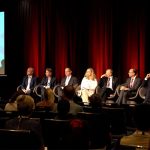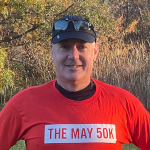- More than 9,000 delegates from 110 countries gathered in Milan to attend the world’s largest MS research conference – the joint ECTRIMS/ACTRIMS conference.
- 1,500 research projects were presented, with the key topics including MS and EBV, biomarkers, silent progression, and future therapeutic strategies.
- The results of a global landscape analysis of MS research to which MS Australia contributed, highlighted potential areas for an enhanced research effort and international collaboration.
The European and American Committees for Treatment and Research in MS (ECTRIMS/ACTRIMS) recently held their joint meeting in Milan, Italy, from 11-13 October 2023.
This meeting is seen as the pinnacle of scientific and medical research into MS, bringing together researchers and health professionals from all around the world to share and hear the latest updates and research findings on the treatment, care and management of MS.
Our team at MS Australia had the privilege of attending this conference to bring the highlights to the Australian community. The knowledge and the collaborations developed will inform our work to keep pushing forward towards the prevention, better treatments and a cure of MS.
Selecting features is never easy, with many sessions running concurrently, but this article provides an overview of some of the key highlights, which we have detailed under MS Australia research priorities of causes and prevention, better treatments and a cure.
The next phase of MS research: closer to cures
Dr Stephen Hauser (University of California, San Francisco) gave the opening lecture, describing advances that have been made in MS research to get us closer to cures.
He stated that the powerful disease modifying therapies (DMTs) that stop nearly all relapses have made researchers more aware that there can be silent progression underlying MS in the absence of relapses.
Dr Hauser argued that current medications can partially suppress MS pathology, but the next phase of research and treatment should concentrate on complete suppression and a cure.
This could be achieved by focusing on understanding the initial stages of MS, where benign autoimmunity is present, but MS pathology is yet to begin.
Causes and prevention of MS
Vitamin D and MS onset: Vitamin D is associated with a reduced risk of MS onset, but it’s unclear whether it’s the vitamin itself or sunlight exposure that increases levels of vitamin D.
Akash Kapali from the University of Bergen in Norway and colleagues looked at vitamin D intake in more than 70,000 women enrolled in the Norwegian Mother and Child Cohort Study, and identified those who developed MS through the country’s MS registry.
Norway has insufficient sun-induced vitamin D production during most of the year. Higher intake of total dietary vitamin D was linked to a 37% lower risk of developing MS, supporting the idea that vitamin D itself is the source of this association.
EBV and the immune system: Dr Thomas Berger from the Medical University of Vienna in Austria presented results of a study that compared the immune systems of people with high levels of Epstein-Barr virus (EBV)-targeted antibodies in their blood, some of whom have MS and some of whom do not.
Dr Berger found that the people living without MS tended to have higher levels of immune natural killer cells capable of eliminating autoimmune reactions such as what is thought to be triggered by EBV. Having specific MS-linked immune genes that inhibit natural killer cells substantially increased the risk of MS.
Better treatments for MS
EBV and AHSCT: In the EBV and clinical trials session, Dr Jennifer Massey from St Vincent’s Hospital NSW presented her work on the reconstitution of the immune system following autologous haematopoietic stem cell transplant (AHSCT). This study revealed that EBV-infected T cells are enriched in people following transplantation.
Health behaviours and modifiable lifestyle choices: Australians also presented in the poster sessions on the role of lifestyle factors in the management of MS.
Associate Professor Yasmine Probst from the University of Wollongong NSW and her team presented on the key considerations for this type of research and ensuring that research outcomes are robust and able to be implemented within the MS community.
Wearable technologies: There is growing attention to finding ways to better track how people are doing day-to-day, in between infrequent clinic visits.
Associate Professor Anneke van der Walt from Monash University VIC provided an overview of wearable and digital technologies, and the opportunities and issues they present.
Treatments in clinical practice: Professor Tomas Kalincik from the University of Melbourne VIC took part in a session on the treatment of MS and the value of different approaches in clinical practice.
This session covered topics such as treatment decisions at different life stages and ages and the role of treatment changes and escalation in light of real-world evidence.
A cure for MS
VISIONARY-MS trial: The early results of a phase 2 clinical trial to assess the safety and effectiveness of CNM-Au8, a gold nanocrystal suspension, in relapsing MS, were presented by Dr Heidi Beadnall from the Brain and Mind Centre NSW.
The results show a promising outcome for the gold nanocrystal suspension to promote protection and repair of the brain and spinal cord by boosting cellular energy metabolism.
Imaging to detect repair: A persistent challenge with studies aiming to protect the brain and spinal cord and promote regeneration is how to quickly detect whether repair has been successful.
Several presentations showed progress toward this goal using advanced MRI, optical coherence tomography (OCT) and positron emission tomography (PET).
Myelin repair by metformin: Dr Anna-Victoria De Keersmaecker, Dr Barbara Willekens and their team from the University of Antwerp, Belgium, are testing the ability of the diabetes treatment metformin to protect the brain and promote myelin repair in people with progressive MS.
They presented their study design and plan to enrol 120 participants across Belgium. They will be looking for improvements or stabilisation of walking speed, cognition (thinking and memory) and other measures of disability, as well as MRI-detected brain volume.
Global research effort to find a cure
The newly formed Global MS Research Strategy Group, representing major MS organisations around the world, including MS Australia, commissioned a study to better understand the landscape of MS research by not-for-profit and government organisations worldwide.
The results were presented at ECTRIMS, showing that at least 1,305 research projects have been funded by 16 not-for-profit organisations, including MS Australia, during 2021-2023. These projects are valued at over €379 million ($390 million AUD) and represent all three Pathways to Cures categories:
Stop: MS in its tracks by ending disease activity and preventing further progression for those who already have MS.
Restore: Restore what has been lost by repairing the nervous system and boosting rehabilitative approaches to restore function.
End: End the disease forever by finding the cause of MS, understanding what triggers it, and protecting against it.
This analysis highlights potential areas for an enhanced research effort and multidisciplinary collaboration.
Global cooperation and alignment of resources will accelerate progress towards knowledge, treatments, and cures for MS.
MS organisations, including MS Australia, have jointly declared their collective commitment to a global research strategy to accelerate cures for MS.
Wrapping up
It was a jam-packed conference with lots of progress in identifying the causes of MS, detecting progression, and finding ways to protect and repair the brain and spinal cord.
In the words of Dr Stephen Hauser, “MS is one of the two or three great success stories of modern molecular medicine. We are halfway home…”.
It has been a great privilege to be able to attend this conference and bring the highlights to the Australian community.
The knowledge and the collaborations developed will inform our own work at MS Australia, to keep pushing forward towards the pathway to cures.




